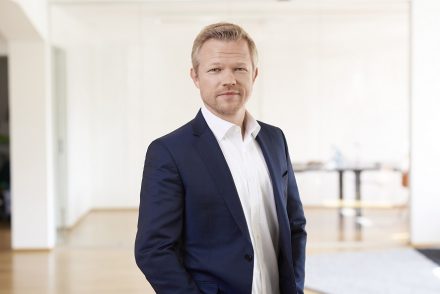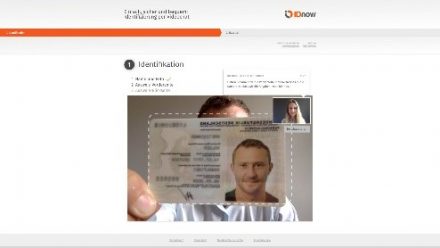The Munich fintech IDnow provides legally compliant video-based identification and eSigning solutions for completing contracts digitally. The company was founded in 2014 by Dennis von Ferenczy, Sebastian Bärhold, Armin Bauer and Felix Haas. The quartet is well known in the startup scene — they founded their ticketing company amiando in 2006, which they sold to Xing for more than 10 million euros in 2011.
IDnow is also on the road to success. The company was just recently distinguished by receiving the Euro Finance Tech Award “Most Successful FinTech.” Legally compliant and patented across the EU, the startup’s video-identification solution makes it possible to verify an individual’s identity by video chat. Until now, it was necessary to show identification in person at the bank or post office to conclude contacts that require identification, like for an account or a loan agreement.
AI-supported identification procedure
Sebastian Bärhold, founder and CFO, said: 
“In an application procedure supported by IDnow, the same process is performed, but it is completely digital, paperless and takes just a few minutes. Moreover, our AI-supported identification procedure is safer than the classic post office identification process.”
With the Video-Ident procedure, it is much easier to complete the whole process with just a valid form of identification and a smartphone or a computer with a webcam.
The startup has focused its offer on companies that need to verify an individual’s identity to acquire customers online: banks, leasing companies, credit card companies, those issuing cryptocurrency, robo-advisors and many more. This focus has led to IDnow’s growth in many European markets.
But how did the former amiando founders come up with the idea? As is often the case, their own experience started it all. Bärhold explained:
“One of our founders wanted to open a bank account on a Saturday. He only got as far as filling out the form online, because he would have needed to go to a bank or post office to identify himself. Both were already closed at that point. So that is how the idea emerged to find an online identification solution that can be used regardless of time or place.”
A true test of patience…
The founders’ patience was put to a major test during an extremely long wait for their Video-Ident procedure to be approved by the German Federal Financial Supervisory Authority (Bundesanstalt für Finanzdienstleistungsaufsicht – BaFin.) When they finally received approval in Spring 2014, they were more than delighted. That was the beginning of video-based identification in Germany.
Sebastian Bärhold remarked:
“That meant there was nothing left to stop our rollout in the German market. It was quite pleasing to be able to bring in noteworthy sales by the end of the year.”
Yet another milestone: expanding to include a qualified electronic signature (QES) in April 2016. Thanks to the EU Regulation on “electronic IDentification, Authentication and trust Services” (abbreviated to eIDAS), the solution is extremely popular across Europe. The EU patent for the video identification procedure then followed in May 2016 — the founders had applied back in 2013.

IDnow’s approach to internationalization
As soon as one challenge has been successfully tackled, the next issues await. The most challenging current topic for IDnow is the internationalization of the company. An increasing number of European countries want to shift to using video-supported identity verification and are adjusting their laws accordingly.
Founder Bärhold elaborated:
“To be active in these markets from the very beginning, we need to be in contact with the markets’ regulators and with potential customers, and that needs to happen simultaneously in many different directions. We have fortunately already done some good groundwork in many foreign markets.”
The Munich startup is already on the market different European countries, e.g. in Spain, Italy and Switzerland with Video-Ident and even on some markets with their eSigning solution as well. Their next target country is France where the introduction of Video-Ident is imminent.
For further international expansion, the Munich businessmen even brought a new CEO on board – Rupert Spiegelberg. He has 17 years of experience in growing technology companies in Europe, the UK and the US with a focus on B2B fintech and regtech companies.
Bärhold explained:
“We need a management structure that corresponds with our development as a technology company that is growing internationally and active in different industries. The appointment of our new CEO Rupert Spiegelberg lays an important cornerstone.”
As CEO for his previous employer, the international software company Investis in New York, Spiegelberg achieved the fastest growth for a US company within the industry. IDnow’s further development should certainly be interesting to follow.
Sustainable corporate development
We asked IDnow founder Bärhold what he thinks — in addition to the right management structure — are important factors for the successful development of a company:
“We need to remain in contact with European regulators to support them in introducing the Video-Ident procedure.”
He added:
“We also need to grow in terms of staff to be successfully represented in new markets and different industries.”
Lessons learned — paving the way
Successful representation, a good image: For companies like IDnow with a B2B2C business model, these factors as well as app and service reviews are important subjects. We wanted to know how IDnow deals with bad reviews. Bärhold explained:
“Firstly, every review is helpful because it can help indicate where there is potential to improve. We check very carefully to see where the source of the problem lies and whether the issue is with technology or with the interaction between the user and video-moderator.”
If a startup listens very carefully to what the customer says, it can learn quite a lot. At the very least, the company can learn just as much as from its own experiences — or mistakes — that are made when founding a startup. That makes it an advantage to have already founded a company and, like Bärhold, to have been involved in establishing several startups. So we asked for his ultimate recommendations for founders:
“1. Don’t get too attached to your very first idea. As a founder, you have to constantly toss out ideas and find new inspiration to develop a really strong product.
2. Do your thing 100%! A successful company requires its founders’ complete dedication.
3. Market orientation is really important. Founders should offer a solution that is distinguished by crystal clear customer value.
4. Be right at the forefront! The best idea is worth nothing without fast and precise implementation.”



